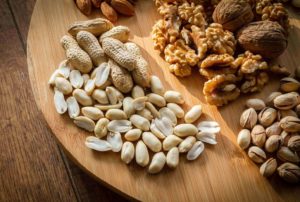Preventing Food Allergies
Food allergies are on the rise, so it’s natural to wonder about the potential harm to your child. According to the Centers for Disease Control and Prevention’s National Health Interview Survey, the prevalence of food allergies in children under 18 increased from 3.4 percent to 5.1 percent between 1997 and 2011. You may feel like every kid at your child’s school has an allergy, or you may be managing this serious medical condition within your own family.
While allergic reactions to food can be serious, it’s important to know the facts and what you can do to prevent food allergy. The groundbreaking LEAP study demonstrated that peanut allergy reaction can be prevented in specific groups of children. As a result, the National Institute of Allergy and Infectious Diseases (NIAID) introduced new guidelines to help prevent peanut allergy in high-risk children.
Guidelines for preventing peanut allergy
Official clinical guidelines to lower the risk of peanut allergy were published by NIAID in January 2017, recommending that parents and caregivers introduce peanut-containing foods during infancy.
The guidelines vary depending on risk level. Ask your food allergy doctor if you are unsure about your child’s risk level. The choice to introduce peanut at home or a health care setting is guided by risk level, test results and parent/provider preference and comfort level.
- High risk (child has severe eczema, egg allergy or both): Introduce age-appropriate peanut-containing foods between 4 and 6 months. It’s highly advisable to have your child tested for peanut allergy first by a board certified allergist . This will help you decide whether to introduce peanut at home or in a healthcare setting.
- Moderate risk (child has mild or moderate eczema alone): Introduce age-appropriate peanut-containing foods around 6 months. Talk to your allergy doctor if you have any specific concerns.
- Low risk (child has neither eczema nor food allergy): Introduce peanut-containing foods depending on your family’s preferences and cultural practices. This is considered safe and should lead to a lower rate of peanut allergy.
Keep in mind that giving your child whole peanuts or straight peanut butter is unwise, as these are choking hazards. Safe forms of peanut described in the NIAID feeding guidelines are Bamba (peanut butter-flavored corn puffs, manufactured by Osem), softened with water for younger babies; smooth peanut butter thinned with water; smooth peanut butter mixed with pureed fruits or vegetables; and peanut butter powder or peanut flour mixed with pureed fruits or vegetables.
Additional tips in preventing food allergy
Additional measures can be taken to prevent food allergy and reduce the risk of serious health consequences. Below are the suggested tips:
- Don’t introduce solid foods before your baby is 17-weeks-old. Babies who ate solid foods before 17-weeks-old were more likely to develop food allergies than those who weren’t exposed to solid foods until later, according to the study.
- Continue breastfeeding. Don’t stop breastfeeding once you start introducing food into your baby’s diet. Research has shown that breastfeeding has a protective effect against allergies. Breast milk is known to regulate the functions of the immune system.
- Limit packaged foods. Another study conducted by the same researchers found that babies who ate more fruits and veggies, and fewer processed foods, were less likely to develop allergies by the time they were 2-years-old.
- Introduce new foods at least four days apart. Then watch carefully for symptoms, such as a rash, unexplained congestion, hives, swelling, itching, vomiting or difficulty breathing. Your baby stands a better chance of outgrowing a food allergy if you identify it early and avoid repeated exposure. But keep in mind that recent research indicates parents tend to dramatically overestimate food sensitivity in their babies. If you suspect a problem, discuss it with your allergy doctor before eliminating the food.
- Check lotion ingredients for peanut oil. If you have a family history of peanut allergies, check the labels of diaper balms, moisturizers or any other salves you might rub onto your baby’s delicate skin. According to a study in The New England Journal of Medicine, using products that contain peanut oil on inflamed skin may be one reason for the growing prevalence of peanut allergies in children.
Science is not clear as to what causes peanut allergy. Both genetic and environmental factors appear to be involved. The best recommendation to those with peanut allergy is to avoid intake. Recent studies have demonstrated that oral immunotherapy helps achieve tolerance, but is only conducted under the guidance of a board certified allergist. It is also crucial to recognize when your child is having an allergic reaction and to respond quickly and properly. For patients with food allergy, Dr. Amy B. Schiffman, an allergist in Boca Raton offers a broad range of allergy management and testing options. To schedule an appointment, contact her at 561-409-2800.

